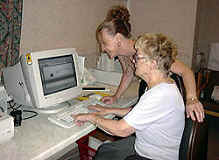|
|
e-Health and the Elderly
How Seniors Use the Internet for Health Information
Kaiser Family Foundation
January 12, 2005

As the Internet becomes an increasingly important resource for informing decisions about health and health care options, a new national survey of older Americans by the Kaiser Family Foundation finds that less than a third (31%) of seniors (age 65 and older) have ever gone online, but that more than two-thirds (70%) of the next generation of seniors
(50-64 year-olds) have done so.
The differences among seniors and 50-64 year-olds are striking and indicate that online resources for health information may soon play a much larger role among older Americans. Twenty-one percent of seniors have gone online to look for health information compared to 53% of 50-64 year-olds; 8% of seniors get "a lot" of health information online compared to 24% of 50-64 year-olds; the Internet is 5th on a list of media sources of health information for seniors compared to first among 50-64 year-olds; and 26% of seniors trust the Internet "a lot" or "some" to provide accurate health information, compared to 58% of 50-64 year-olds.
The survey also finds that a significant digital divide could leave those most in need with less information on which to base important health care decisions. Seniors whose annual household income is under $20,000 a year are much less likely to have gone online (15%) than those with incomes between $20,000-49,000 (40%) or those with incomes of $50,000 a year or more (65%). Most seniors (64%) on Medicare fall into that lowest income category of under $20,000 a year, while just 8% have an income of $50,000 or more. Furthermore, seniors with only a high school degree or less are much less likely to have gone online than those with some college or a college degree (18% v. 45% v. 60%).
"We know that the Internet can be a great health tool for seniors, but the majority are lower-income, less well educated and not online," said Drew Altman, President and CEO, Kaiser Family Foundation. "It's time for a national discussion on how to get seniors online."
With the passage of Medicare reform that allows recipients to choose prescription drug discount cards, the federal Web site Medicare.gov has become an important resource for comparing the benefits of competing cards. The survey, conducted in March- April 2004, found that 2% of all seniors had gone online to Medicare.gov (further tracking surveys by the Foundation indicate that number has remained relatively stable, at 4% in June, 8% in October, and 3% in December 2004).
The survey - "e-health and the Elderly: How Seniors Use the Internet for Health" - is being released at a briefing today in Washington, D.C. that includes representatives of AOL, the National Institute on Aging, the AARP, and SeniorNet, an organization that helps train older Americans in computer skills.
Additional Findings:
Most Popular Health Topics Researched Online
* Prescription drugs top the list of health care topics researched, with more than a third (37%) of online seniors (13% of all seniors) saying they've looked online for drug information, including 16% (5% of all seniors) who say they have used the Internet to compare prices for prescription drugs, and 15% (5% of all seniors) who say they have actually purchased prescription drugs online. Other popular health-related searches include nutrition, exercise or weight issues (30% of online seniors; 9% of all); cancer (23% of online, 7% of all); and heart disease and arthritis (21% each of online and 6% of all).
* 16% of online seniors say they have used the Internet to follow news coverage of health policy issues (5% of all seniors), while 14% say they have looked for information about health providers online (4% of all).
Influence of Online Information on Health Behaviors
* Among those seniors who have gone online for health information, a third (34%; 7% of all seniors) say they have talked with a doctor or other provider about information they found online; 23% (5% of all seniors) say they changed their own behavior because of information they found online; and 23% say they made a decision about how to treat an illness or condition.
* 19% of those who have looked for health information online say they check the source "always" or "most of the time," while 58% say they "never" or "hardly ever" do this.
Online Contact From Doctors and Drug Companies
* Just 3% of 50-64 year-olds and 1% of seniors say a doctor has ever recommended a particular health or medical Web site to them.
* Among those seniors who have ever used e-mail, 7% have communicated with a doctor or other provider via e-mail, while more than half (54%) have received e-mails from pharmaceutical companies and others advertising drugs, supplements, or other medical products.
Seniors Keeping in Touch
* Among those seniors who go online, about a third say they consider e-mail (34%) and the Internet (33%) "an important part of your life that they wouldn't want to do without."
* About half (56%) of seniors who use e-mail say it makes it "a lot" easier for them to stay in touch with family and friends.
Methodology
e-Health and the Elderly is a nationally representative, random digit dial telephone survey of 1,450 adults age 50 and older, including 583 respondents age 65 and older. The survey was designed and analyzed by staff at the Kaiser Family Foundation in consultation with Princeton Survey Research Associates (PSRA), with fieldwork conducted by PSRA. The interviews were conducted from March 5 - April 18, 2004.
The margin of sampling error for the complete set of weighted data is +/- 3%, and for those aged 65 and older it is +/- 4%. For results based on smaller subsets of respondents the margin of error is higher. Note that sampling error is only of many potential sources of error in this or any other public opinion poll.
|
|



